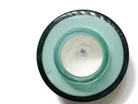New cream can cure cases of skin cancer without surgery

Scientists have developed a new cream which can cure cases of skin cancer and remove the need for patients to undergo radioactive therapy or surgery.
The treatment, which is being described as a radioactive paste or paint, has already been tested on 700 patients and has had a success rate of 95 percent.
It is effective when used against tumours resulting from the most common strains of skin cancer and works in just two hours.
There are now hopes the cream will be used to cure 3,000 patients of skin cancer every year.
To read the latest edition of Healthcare Global, click here
- UK to open ‘obese morgue’ with slabs that can hold 50st
- Babies born from frozen embryos are healthier
- Driving with a cold is ‘as dangerous as drink driving’
According to the scientists who developed the cream, it is a painless treatment and comes with minimal side effects.
Additionally, the radioactive elements in it promote new skin growth and therefore do not leave patients with unsightly scars.
However, the team has said it is only suitable for use on patients with non-melanoma skin cancer and cannot be used on those suffering from malignant melanomas, the most fatal form of the cancer.
The cream contains a radioactive isotape known as rhenium-188 and during the treatment a piece of foil is placed over the tumour area with the cream painted on top of it.
It is then removed after one to two hours.
Results of the initial patient trails of the treatment were promising – the skin cancer was cured in 85 percent of patients after just one treatment and after three goes 95 percent had seen their skin cancer disappear.
German technology firm ITM developed the groundbreaking therapy and Oliver Buck, its chief executive, said: “These people sometimes have to go through horrible surgery which removes part of their face.
“By contrast this treatment is generally done in a single non-invasive session.”
“The radiation does not affect surrounding tissue and also seems to activate the body’s healing mechanisms,” he added.
“This means that patients with large and difficult-to-treat tumours not only have hope but keep their quality of life under what would otherwise be dire conditions.”
Buck believes it will be considerably cheaper than current skin cancer treatments and those who are likely to benefit most from the innovation are patients with tumours that cannot be removed surgically.
Additional trials of the cream are now underway in Germany and Australia.
The Healthcare Global magazine is now available on the iPad. Click here to download it.



